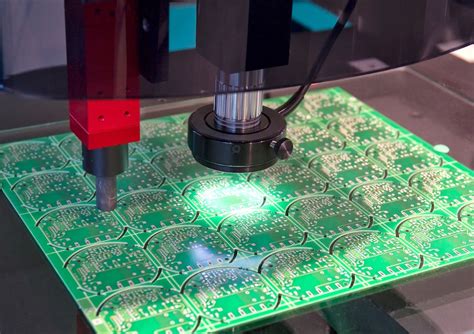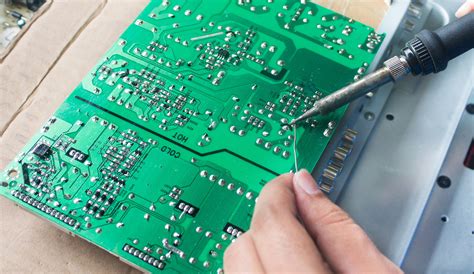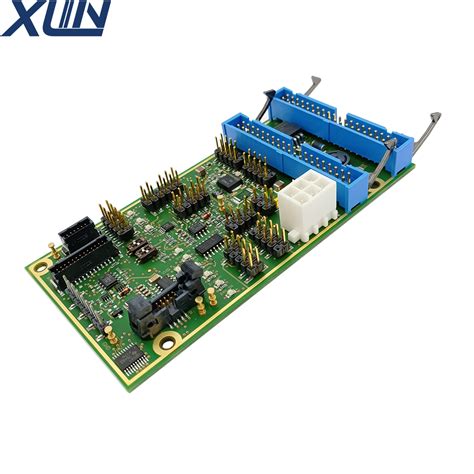Streamlining Success: The Benefits of Turnkey Assembly Services for Your Business
Key Takeaways
Turnkey assembly services offer a transformative approach for businesses aiming to enhance their operational efficiency. By utilizing turnkey solutions, companies can delegate complex tasks, such as pcb assembly and pcba, to specialized providers, allowing them to prioritize their core competencies. This outsourcing strategy not only reduces costs but also optimizes lead times, thus playing a pivotal role in increasing overall competitiveness within the marketplace. Furthermore, these services streamline logistics, making supply chain management simpler and more effective. When businesses invest in professional assembly services, they often experience an improvement in product quality, as these experts bring precision and experience to the process. The scalability offered by turnkey assembly enables businesses to swiftly adapt to shifting market demands without compromising on effectiveness or quality. As a result, companies that leverage these comprehensive solutions can significantly accelerate their time-to-market, establishing a robust foundation for sustainable growth and competitive advantage.
Understanding Turnkey Assembly Services: A Comprehensive Overview
Turnkey assembly services have emerged as an innovative solution for businesses seeking to enhance their operational efficiency and streamline their production processes. At their core, these services provide comprehensive solutions that handle the assembly of products, freeing companies from the burdens associated with managing this complex task in-house. One of the key advantages of utilizing turnkey services is the ability to focus on core competencies, allowing businesses to allocate resources more effectively. By outsourcing tasks such as pcb assembly and pcba, a company can concentrate on design, marketing, and other critical areas that drive growth.
Moreover, these services contribute significantly to cost reduction. By leveraging specialized expertise and advanced technologies in turnkey solutions, businesses can lower labor costs and minimize material waste. The table below illustrates a comparison of in-house assembly versus utilizing turnkey assembly services:
| Aspect | In-house Assembly | Turnkey Assembly Services |
|---|---|---|
| Resource Allocation | High labor investment | Optimized resource utilization |
| Production Efficiency | Slower due to learning curve | Faster due to established processes |
| Quality Control | Variable based on team experience | Consistent due to professional oversight |
| Scalability | Limited flexibility | Easily scalable based on demand |
“Outsourcing assembly tasks not only simplifies logistics but also enables businesses to scale rapidly in response to market changes.”
Adopting a turnkey approach dramatically enhances logistics management. As companies work with experts who manage supply chain intricacies, they can reduce lead times and improve overall delivery schedules. Additionally, professional assembly contributes positively to product quality, leveraging advanced methodologies that ensure high standards are met consistently.
In conclusion, understanding turnkey assembly services is vital for any business looking to enhance efficiency and maintain competitiveness in today’s fast-paced marketplace. By integrating these solutions into operational structures, organizations will find themselves better positioned for growth and adaptation in an ever-changing business landscape.
The Cost Benefits of Outsourcing Assembly Tasks
Outsourcing assembly tasks to turnkey service providers can lead to significant cost savings for businesses, allowing them to allocate resources more effectively. By integrating pcb assembly and pcba processes into a streamlined outsourcing model, companies can minimize overhead expenses associated with maintaining in-house assembly operations. This shift not only reduces labor costs but also cuts down on the need for investing in specialized equipment and technology. Moreover, manufacturers can take advantage of the economies of scale offered by turnkey service providers, which often lead to lower material costs. In addition to direct financial benefits, outsourcing enables businesses to mitigate risks associated with production fluctuations and workforce availability. As a result, companies can maintain consistent quality while avoiding the financial burden of excess labor during lean periods. Ultimately, embracing turnkey assembly services equips businesses with the flexibility to adapt their production levels without incurring substantial fixed costs, thus enhancing their overall financial health.
How Turnkey Solutions Enhance Operational Efficiency
Turnkey assembly services play a crucial role in enhancing operational efficiency for businesses across various industries. By outsourcing assembly tasks, companies can redirect their focus towards their core competencies, creating a more streamlined workflow. This approach allows businesses to minimize overhead costs associated with hiring and training in-house teams. Furthermore, employing turnkey solutions reduces lead times, enabling faster potential market entry.
A prime example is PCB assembly, where specialized providers offer comprehensive management of the manufacturing process, ensuring high-quality components are utilized. This not only elevates the final product through superior standards but also mitigates risks commonly associated with assembly processes. The integration of PCBA services facilitates real-time adjustments and enhancements throughout production, making it easier for businesses to scale operations rapidly in response to fluctuating market demands.
In essence, leveraging the expertise of turnkey solutions can unlock significant efficiencies and improve overall productivity, allowing businesses to thrive in a competitive environment while delivering top-notch products efficiently.
Streamlining Logistics: Simplifying Supply Chain Management
In today’s competitive landscape, effectively managing logistics is paramount for any business, particularly when it comes to pcb assembly and pcba tasks. By adopting turnkey assembly services, companies can significantly enhance their supply chain management processes. These services not only offer a streamlined approach to logistics but also provide a systematic method for overseeing the flow of materials and products from suppliers to customers. Engaging with specialized providers ensures that the complexity of logistics is handled by experts who optimize every step, from procurement to delivery. As a result, businesses can minimize delays and maximize efficiency, leading to lower operational costs.
Moreover, outsourcing these assembly processes allows organizations to redirect their focus toward core competencies, fostering innovation and growth. When logistics are simplified through integrated turnkey solutions, teams can prioritize strategic initiatives rather than getting bogged down in intricate supply chain issues. This streamlined focus often translates into enhanced responsiveness to market demands and customer needs.
In addition, by leveraging the resources of a professional assembly partner, businesses gain access to cutting-edge technology and methodologies that improve accuracy in the pcb assembly process. This not only bolsters production efficiency but also elevates product quality through consistent standards in professional assembly tasks. As supply chains evolve towards greater complexity, having an adept partner managing logistics becomes invaluable for sustaining competitive advantage in an ever-changing marketplace. Ultimately, transitioning towards turnkey services represents not just an operational shift but a strategic move towards success in today’s dynamic business environment.
Improving Product Quality Through Professional Assembly
In today’s competitive landscape, product quality can be a key differentiator for businesses. Engaging in professional assembly services, particularly in the realm of PCB assembly and PCBA, ensures that products meet stringent quality standards. By utilizing expert assemblers who are trained in the latest techniques and equipped with advanced tools, companies can enhance their overall production reliability. One significant advantage of outsourcing assembly tasks is the meticulous attention to detail that specialized firms can offer—this focus often results in fewer defects and higher overall quality in finished products.
When businesses delegate their assembly processes to professionals, they benefit from the rigorous testing and quality control measures that these organizations implement. Such thorough validation not only minimizes the risk of product failure but also streamlines compliance with relevant industry standards. Additionally, utilizing these turnkey assembly services provides companies with an opportunity to tap into innovative techniques and technology that improve product design and functionality during the pcb assembly phase.
With consistent emphasis on quality assurance, professional assembly helps businesses build brand loyalty among customers who value reliable and high-performing products. As market demands evolve, leveraging professional expertise in areas like PCBA allows companies to adapt swiftly while maintaining a strong commitment to product excellence. Ultimately, by integrating these services into their operational framework, businesses can foster an environment where quality is prioritized, leading to long-term growth and customer satisfaction.
Scalability in Business: Adapting to Market Demands
In today’s fast-paced and ever-changing market landscape, businesses must demonstrate scalability to thrive amid fluctuating consumer demands. One of the critical advantages of utilizing turnkey assembly services is the ability to adjust operations swiftly and efficiently. This flexibility enables companies to scale their production up or down without the typical overhead costs associated with in-house assembly. By outsourcing assembly tasks, particularly in areas such as PCB assembly and PCBA, organizations can respond more effectively to market trends, ensuring that they are not left with excess inventory or unsatisfied customers. These services provide a comprehensive framework that allows businesses to manage their resources effectively while focusing on their core competencies. Moreover, as demand peaks or shifts, turnkey solutions streamline the entire process, enhancing not only operational efficiency but also allowing for greater responsiveness to customer needs. This adaptability can be a significant differentiator in today’s competitive landscape where speed and reliability are paramount for success.
Accelerating Time-to-Market with Turnkey Assembly Services
One of the most significant advantages of utilizing turnkey assembly services is the ability to accelerate time-to-market for products. In today’s fast-paced business environment, the ability to launch products rapidly can provide a crucial competitive edge. By outsourcing tasks such as pcb assembly or pcba, companies can free up internal resources and focus on core innovations and marketing strategies. Turnkey solutions streamline every aspect of the assembly process, from sourcing components to final production, ensuring that businesses can bring their offerings to market without unnecessary delays. Furthermore, integrating turnkey assembly services often leads to improved utilization of advanced technologies and expertise in assembly processes, enhancing overall efficiency. As businesses rely on these comprehensive services, they not only shorten lead times but also create opportunities for quick adjustments in response to market demands or customer feedback. This increased agility enables companies to meet customer expectations more effectively while maintaining high standards of quality throughout the production cycle.
Staying Competitive: The Role of Turnkey Solutions in Business Growth
In today’s rapidly evolving business landscape, staying competitive requires a strategic approach to leveraging resources and optimizing processes. Turnkey assembly services provide a compelling solution for businesses aiming to enhance their growth trajectory by focusing on their core competencies. By outsourcing tasks such as pcb assembly or pcba, companies can unlock their full potential while significantly reducing operational costs. These services facilitate seamless integration of complex assembly tasks, allowing firms to redirect their efforts toward innovation and market expansion. Furthermore, turnkey solutions streamline production processes, minimizing lead times and ensuring that products meet stringent quality standards. As businesses adapt to fluctuating market demands, the scalability enabled by turnkey providers becomes increasingly valuable. This approach not only fosters efficiency but also empowers organizations to respond swiftly to opportunities and challenges alike, ultimately promoting sustainable growth in a competitive environment. By harnessing the advantages of turnkey solutions, businesses can fortify their position in the marketplace and pave the way for future successes.
Conclusion
In conclusion, the adoption of turnkey assembly services represents a significant strategic move for businesses aiming to optimize their operations. By incorporating services such as pcb assembly and pcba, companies can dramatically enhance their production capabilities while focusing on their core functions. These services not only facilitate a more agile response to market demands by providing scalability but also contribute to substantial cost savings. The integration of turnkey solutions streamlines logistics, ensuring that supply chain management is more efficient and less prone to delays. Additionally, the professionalism associated with these services can lead to improved product quality, which enhances overall customer satisfaction and loyalty. By leveraging these innovative assembly methods, businesses can not only accelerate their time-to-market but also firmly position themselves in a competitive landscape, ultimately transforming potential challenges into pathways for growth and success.
FAQs
When exploring turnkey assembly services, many businesses have common questions regarding their operations and advantages. One frequently asked question is: “What is the difference between pcb assembly and standard assembly?” The answer lies in the specialization involved in pcba (Printed Circuit Board Assembly), which focuses on integrating electronic components onto printed circuit boards. This process not only requires precision but also expertise to ensure that the electronics function correctly and efficiently.
Another common inquiry pertains to the cost-effectiveness of outsourcing assembly tasks. Businesses often wonder if choosing turnkey solutions could truly reduce their expenses. The answer is a resounding yes; by outsourcing, companies can minimize labor costs, overhead, and even the need for extensive in-house infrastructure, which can drastically streamline their budget.
Moreover, companies may ask about the scalability of these services. As market demands fluctuate, businesses must be able to adapt swiftly without extensive investments in additional resources. Turnkey assembly services provide that flexibility, allowing businesses to ramp up or scale down operations as required.
Lastly, quality assurance often comes into question: how do these services ensure consistent product quality? Professional turnkey providers typically employ stringent quality control measures throughout the assembly process to maintain high standards, allowing firms to focus on their core competencies without compromising on output.
For more information about enhancing your business operations with effective pcb assembly, please click here.







